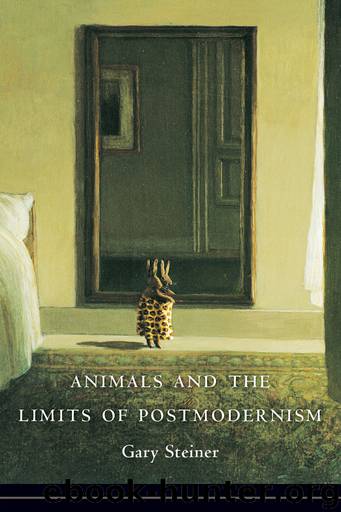Animals and the Limits of Postmodernism by Steiner Gary;

Author:Steiner, Gary; [Steiner, Gary]
Language: eng
Format: epub
Publisher: Columbia University Press
Published: 2013-02-22T16:00:00+00:00
CHAPTER FIVE
Toward a Nonanthropocentric Cosmopolitanism
HISTORICAL COSMOPOLITAN IDEALS
The ideal of civil society that prevails today owes a direct debt to Enlightenment thinkers such as Kant, who sought to articulate the importance of notions such as autonomy, equality, reciprocity, and mutual respect for any viable system of political decision making. But our contemporary ideal owes an equal if indirect debt to an ancient cosmopolitan ideal according to which human beings are morally superior to all other natural beings and hence enjoy a natural prerogative to use nonhuman beings to satisfy human needs and desires. Kant does not invent the cosmopolitan ideal but simply modifies it in accordance with the liberal humanist notion of the individual that had developed through the reflections of the Christian humanists in the Renaissance and those of Descartes and the social contract thinkers in modernity. Thus to the extent that the ancient cosmopolitan ideal is fundamentally anthropocentric, it should come as no surprise that Enlightenment cosmopolitanism and our contemporary ideal of civil society are likewise anthropocentric.
For the Western philosophical tradition this posed no problem since the tradition conceived of society as being concerned exclusively with human relationships and activities. And for many people today, this still poses no problem whatsoever. But for anyone concerned with the fortunes of nonhuman animals, it has become a matter of serious controversy whether the concept of society or community should ultimately be restricted to human beings, particularly given the fact that so many of our activities and cultural practices involve the subjection and exploitation of animals. For if social relationships and responsibilities are conceived in exclusively human terms, then, in accordance with the ancient cosmopolitan ideal advanced by the Stoics, animals are categorically excluded from the sphere of justice, and nothing we do to animals can be classified as unjust. According to early Greek writers such as Hesiod, human society originated in a “golden age” in which human beings shared a fundamentally peaceful existence not only with one another but also with animals. Human beings lived as if they were gods, without having to struggle for their existence, and without having to kill and eat animals.1 Only after a sort of fall from grace did human beings become violent toward one another and toward animals, and only then did it become necessary for Zeus to impose dike or the law of justice and peace. According to Hesiod, Zeus thereby placed all human beings in the sphere of justice and expressly excluded all animals—apparently on the grounds that animals were not capable of “listen[ing] to justice.”2 Ovid, too, offers a Verfallsgeschichte, the beginning of which is a golden age in which humans and animals lived together in a sort of paradise.3 To the extent that the historical roots of our received conception of justice lie in an ideal of peaceful coexistence with animals, it strikes me as odd that our conception of justice categorically excludes any consideration of animals. Or perhaps it is the other way around: given that our traditional conception of
Download
This site does not store any files on its server. We only index and link to content provided by other sites. Please contact the content providers to delete copyright contents if any and email us, we'll remove relevant links or contents immediately.
| Deconstruction | Existentialism |
| Humanism | Phenomenology |
| Pragmatism | Rationalism |
| Structuralism | Transcendentalism |
| Utilitarianism |
The remains of the day by Kazuo Ishiguro(7550)
Tools of Titans by Timothy Ferriss(6945)
The Black Swan by Nassim Nicholas Taleb(6190)
Inner Engineering: A Yogi's Guide to Joy by Sadhguru(5893)
Giovanni's Room by James Baldwin(5877)
The Way of Zen by Alan W. Watts(5798)
The Six Wives Of Henry VIII (WOMEN IN HISTORY) by Fraser Antonia(4789)
The Power of Now: A Guide to Spiritual Enlightenment by Eckhart Tolle(4753)
Astrophysics for People in a Hurry by Neil DeGrasse Tyson(4619)
Asking the Right Questions: A Guide to Critical Thinking by M. Neil Browne & Stuart M. Keeley(4573)
12 Rules for Life by Jordan B. Peterson(3733)
The Ethical Slut by Janet W. Hardy(3502)
Skin in the Game by Nassim Nicholas Taleb(3459)
Housekeeping by Marilynne Robinson(3401)
The Art of Happiness by The Dalai Lama(3382)
Double Down (Diary of a Wimpy Kid Book 11) by Jeff Kinney(3272)
Skin in the Game: Hidden Asymmetries in Daily Life by Nassim Nicholas Taleb(3264)
Walking by Henry David Thoreau(3234)
12 Rules for Life: An Antidote to Chaos by Jordan B. Peterson(3200)
